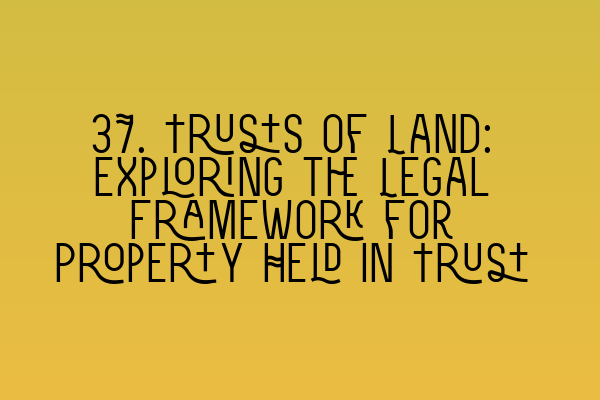37. Trusts of Land: Exploring the Legal Framework for Property Held in Trust
Welcome to SQE Property Law & Land Law, where we aim to provide you with comprehensive information and insights into the intricate world of property law and land law. In this blog post, we will delve into the topic of trusts of land and explore the legal framework surrounding property held in trust. Whether you are a solicitor, aspiring lawyer, or simply interested in understanding the complexities of trusts of land, this article is for you.
Understanding Trusts of Land
Trusts of land are legal arrangements in which property is held by one party (the trustee) on behalf of another party (the beneficiary). These arrangements are governed by a set of legal principles and regulations that determine the rights, obligations, and responsibilities of all parties involved.
Trusts of land can be established for various purposes, such as investment purposes, family protection, or charitable causes. The trust document, often known as a trust deed, outlines the terms and conditions under which the trustee holds and manages the property for the benefit of the beneficiary.
The Legal Framework for Trusts of Land
Trusts of land in the United Kingdom are primarily governed by the Trusts of Land and Appointment of Trustees Act 1996 (TOLATA). TOLATA provides a comprehensive legal framework for the creation, administration, and termination of trusts of land.
Under TOLATA, trustees have a fiduciary duty to act in the best interests of the beneficiaries. This includes managing the property prudently, keeping accurate records, and making decisions that align with the purposes of the trust. Trustees are also obligated to account for their actions and decisions, ensuring transparency and accountability.
Moreover, TOLATA offers provisions for resolving disputes related to trusts of land. In cases where disagreements arise between beneficiaries, trustees, or third parties, the courts have the authority to intervene and make appropriate orders or directions to protect the interests of all parties involved.
Key Considerations for Trusts of Land
When dealing with trusts of land, there are several key considerations that solicitors and legal professionals must keep in mind:
- Legal formalities: Trusts of land must comply with certain legal formalities, such as being in writing and properly executed. A well-drafted trust deed is essential to ensure the validity and enforceability of the trust.
- Beneficiary interests: The interests of the beneficiaries should be clearly defined in the trust deed. This includes determining their beneficial interests in the property, such as the right to occupy, receive income, or sell the property.
- Trustee duties: Trustees have a range of duties and responsibilities, including the duty of care, loyalty, and impartiality. Legal professionals must ensure that trustees are aware of their obligations and act in accordance with the law.
- Dispute resolution: It is crucial to consider mechanisms for dispute resolution within the trust deed. This can help avoid lengthy and costly court proceedings and enable parties to resolve disputes amicably.
If you need assistance in drafting or interpreting a trust of land, our team of experienced solicitors at SQE Property Law & Land Law can provide expert advice and guidance. We have extensive knowledge in trusts of land matters and can help you navigate the legal complexities.
Conclusion
Trusts of land play a significant role in property law, allowing for the effective management and protection of property for the benefit of beneficiaries. Understanding the legal framework surrounding trusts of land is crucial for solicitors and legal professionals who deal with such arrangements.
At SQE Property Law & Land Law, we understand the importance of staying updated and knowledgeable in property law. We offer comprehensive SQE 1 and SQE 2 preparation courses to help aspiring lawyers and solicitors excel in their exams. Don’t forget to check out our SQE 1 Practice Exam Questions and SQE 2 Preparation Courses to boost your confidence and enhance your understanding of property law and land law.
For more information about our courses or to book a consultation with one of our solicitors, visit our SQE 1 Preparation Courses or SQE 2 Preparation Courses pages. Stay updated with the latest SRA SQE Exam Dates for your exam planning needs.
